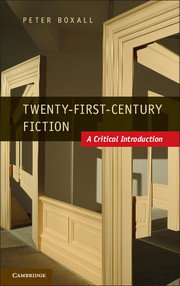Book contents
- Frontmatter
- Dedication
- Miscellaneous frontmatter
- Contents
- Illustrations
- Acknowledgements
- Introduction Twenty-First-Century Fiction
- 1 Late Culture in the Early Twenty-First Century
- 2 Inheriting the Past
- 3 The Limits of the Human
- 4 A Curious Knot
- 5 Sovereignty, Democracy, Globalisation
- Conclusion The Future of the Novel
- Notes
- Bibliography
- Index
Introduction - Twenty-First-Century Fiction
Published online by Cambridge University Press: 05 July 2013
- Frontmatter
- Dedication
- Miscellaneous frontmatter
- Contents
- Illustrations
- Acknowledgements
- Introduction Twenty-First-Century Fiction
- 1 Late Culture in the Early Twenty-First Century
- 2 Inheriting the Past
- 3 The Limits of the Human
- 4 A Curious Knot
- 5 Sovereignty, Democracy, Globalisation
- Conclusion The Future of the Novel
- Notes
- Bibliography
- Index
Summary
The title of this book might be phrased as a question: is there such a thing as twenty-first-century fiction? Can we identify a set of thematic or stylistic characteristics that mark a new phase in the development of the novel, that would allow us to speak meaningfully of the twenty-first-century novel, as we might of the nineteenth-century novel, or the modernist novel, or the postmodernist novel? Has our century come into sharp enough focus for us to ascribe to its cultural practices a character, a mood a structure of feeling?
Of course, such a question is framed to a significant extent by the moment in which we ask it, and by the youth of the time that we find ourselves living in. I am writing in the second decade of the century, when the turn of the millennium seems to be a fresh memory, not yet stored in the archive of the mind but still somehow in everyday use. The firework celebrations that marked the event, the skittish global panic about the Y2K computer bug and then the 2001 attacks in New York that seem to so many to mark the real entry to the new millennium, these have not yet, for me at least, faded to newsprint, to sepia, but seem part of the living tissue of the present. As a result, the attempt to offer a definition or a critical description of any twenty-first-century cultural activity is beset by the problem that attends all efforts to capture the contemporary: that is, that the time we are living through is very difficult to bring into focus, and often only becomes legible in retrospect. This is a problem that is captured with striking elegance and precision by Jean-Paul Sartre, in his 1939 essay on William Faulkner’s great twentieth-century novel The Sound and the Fury. The present, Sartre writes, is ‘nothing but a disordered rumour’; the moment that we occupy is always ‘indefinable and elusive’. The attempt to focus on the present, Sartre writes, ‘can be compared to a man sitting in a convertible looking back’ (p. 228). When we look backwards out of a speeding car, the place we are occupying at any given time is a simple, lateral blur, which resolves itself into a picture only when we have left it behind, as it fades into the distance.
- Type
- Chapter
- Information
- Twenty-First-Century FictionA Critical Introduction, pp. 1 - 18Publisher: Cambridge University PressPrint publication year: 2013
- 1
- Cited by

